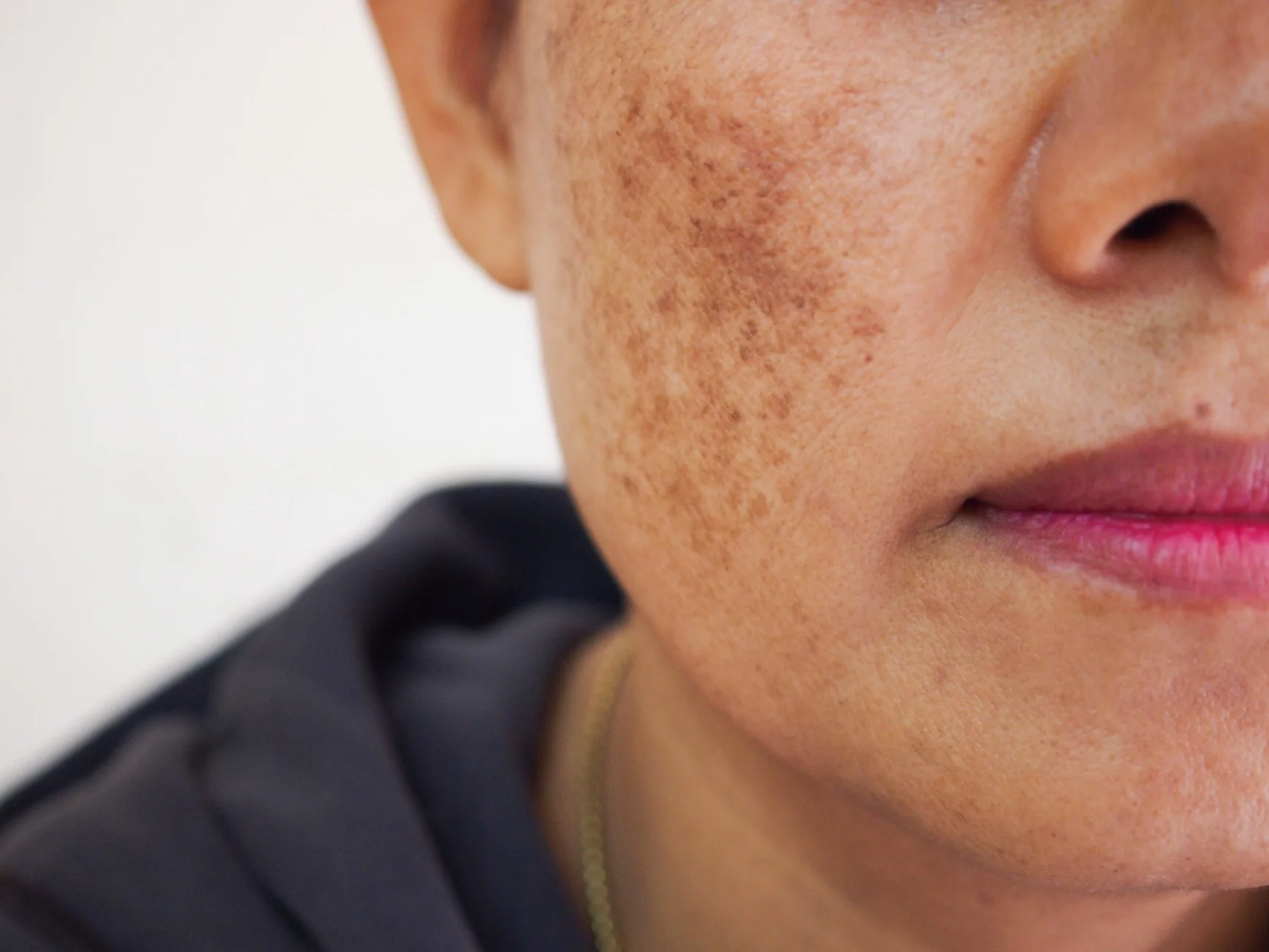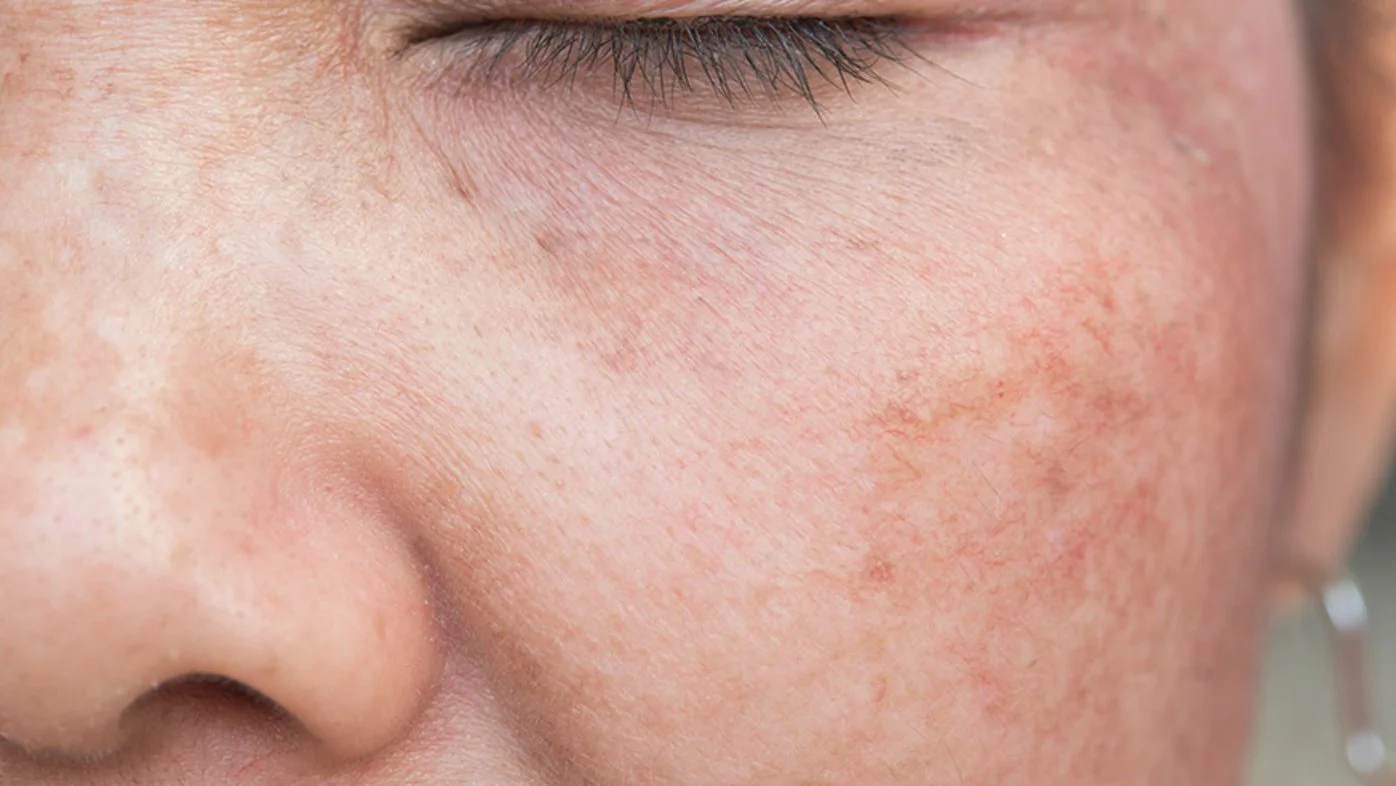Hyperpigmentation

Hyperpigmentation Treatment
Hyperpigmentation is a common skin condition wherein certain areas of the skin become darker than the surrounding area. An overproduction of melanin, the pigment responsible for skin color, causes this to happen. A variety of factors can lead to hyperpigmentation, such as sun exposure, hormonal changes, inflammation, and certain medications. Most commonly, it appears as patches or dark spots on the skin, particularly on the face and hands. Common types include melasma, sunspots, and post-inflammatory hyperpigmentation which often follows acne or skin injuries. Treatment options to address hyperpigmentation include topical lightening agents, chemical peels, and laser therapy. These treatments function by either decreasing melanin production or gently targeting and clearing pigmented areas using specialized technologies.
Hyperpigmentation can affect people with any skin type and age, although it is more common in those with darker skin tones due to higher melanin levels. When seeking treatment for Hyperpigmentation in Northbrook, IL, you can expect an individualized approach tailored to your skin type and the specific cause of your hyperpigmentation. The duration of the treatment for hyperpigmentation varies depending on the severity of the condition. Some patients may see improvement in a few weeks, while others may require several months of consistent care. If you’re concerned about dark spots or uneven skin tone, consider booking an appointment at Derm Collective North Shore in Northbrook, IL, to explore effective treatment options for clearer, more even skin tone.
Melasma
Melasma is a common skin condition that involves dark, discolored patches on the skin, usually on the face — primarily the cheeks, forehead, and upper lip. The etiology involves a combination of genetic factors, sun exposure, hormonal changes (such as those during pregnancy), and certain medications. Melasma is more common in women, particularly those with darker skin tones, and is typically triggered by hormonal changes and sun exposure. Due to its frequent occurrence in pregnant women, it is commonly called “the mask of pregnancy.”
This hyperpigmentation can be particularly frustrating due to its impact on appearance and the difficulty of achieving long-term results. Treatment options for melasma include topical lightening agents, chemical peels, and sun protection to prevent further darkening. In order to obtain an accurate diagnosis and develop an effective treatment plan for melasma, it is important to consult a dermatologist.


Sun Damage
Sun damage, also known as photoaging, results from prolonged exposure to ultraviolet (UV) rays, leading to premature aging of the skin. The etiology of sun damage includes UV rays breaking down collagen and elastin, causing wrinkles, fine lines, and loss of skin elasticity. Other clinical symptoms include sunspots, hyperpigmentation, and an increased risk of skin cancer. This condition can be particularly frustrating as it affects both skin health and appearance. Treatment options include topical retinoids, antioxidants, chemical peels, and laser therapy to reduce signs of damage. A customized treatment plan with a dermatology provider that addresses sun damage is extremely beneficial to ensuring the right course of action to clear damage and rejuvenate the skin.
Lentigos / Sun Freckles / Brown Spots
Lentigines, commonly known as sunspots or age spots, are brown, flat, or black spots that develop on sun-exposed areas of the skin, such as the face, hands, and shoulders. The etiology of sunspots is primarily due to prolonged exposure to ultraviolet (UV) rays, which increase melanin production and lead to the formation of these dark spots. Clinical symptoms include small, flat patches that vary in size and color intensity. While harmless, sunspots can be aesthetically frustrating and may be mistaken for other skin conditions. Treatment options include topical lightening agents, chemical peels, cryotherapy, and laser therapy to reduce their appearance. Skincare professionals can help provide an accurate diagnosis and provide a customized treatment plan aimed at reducing sunspots, improving skin health, and improving skin tone.

Benefits of Treating Hyperpigmentation
- Evens out skin tone
- Reduces the appearance of dark spots
- Improves overall skin texture
- Boosts confidence in your appearance
- Addresses underlying causes of discoloration
- Prevents further pigmentation from forming
- Enhances the effectiveness of skincare products
- Provides long-lasting results with proper care
- Customizable treatments for different skin types
- Professional guidance and support throughout the process
Faqs About Hyperpigmentation
Can hyperpigmentation be prevented?
It may not be entirely preventable, but you can reduce the risk of hyperpigmentation by using sunscreen daily, avoiding excessive sun exposure, and following a proper skincare routine that includes gentle exfoliation and the use of products designed to maintain an even skin tone.
Are over-the-counter products effective for treating hyperpigmentation?
Over-the-counter products containing ingredients like vitamin C, retinoids, or alpha hydroxy acids can help lighten hyperpigmentation, but more severe cases may require prescription-strength treatments or professional procedures.
Can hyperpigmentation return after treatment?
Yes, hyperpigmentation can return, especially if the underlying cause remains unaddressed or if the skin is not properly protected from the sun. Ongoing maintenance and sun protection are crucial to preventing recurrence.
Is hyperpigmentation permanent?
Hyperpigmentation is not always permanent. Many cases can be significantly improved or resolved with appropriate treatment, though the time frame and results vary depending on the severity and type of hyperpigmentation.
Can all skin types be treated for hyperpigmentation?
Yes, all skin types can be treated for hyperpigmentation, but the approach may vary. It’s important to work with a dermatologist who understands the nuances of treating different skin tones to avoid complications.
Are there any side effects associated with hyperpigmentation treatments?
Side effects depend on the treatment method but may include temporary redness, peeling, or sensitivity. Your dermatologist will discuss potential side effects and how to manage them during the treatment process.

